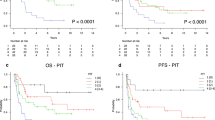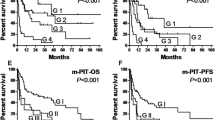Abstract
The Glasgow Prognostic Score (GPS) serves a prognostic role in several lymphomas. The objectives of the present study were to determine whether GPS predicts clinical outcomes and to compare the utility of four prognostic scores, including GPS, in patients diagnosed with peripheral T-cell lymphoma (PTCL). We selected for this retrospective study 96 patients consecutively diagnosed with PTCL according to the World Health Organization classification from January 2002 to February 2013 and followed up in five different institutions. Low GPS was a good prognostic biomarker of progression-free survival (PFS, P = 0.030) and overall survival (OS, P = 0.013). Estimated 3-year OS rates (low-risk vs. intermediate- or high-risk) by the International Prognostic Index (IPI), the Prognostic Index for T-cell lymphoma (PIT), the International Peripheral T-cell Lymphoma Project (IPTCLP) score, and GPS were 83% vs. 44% (P < 0.001), 68% vs. 37% (P = 0.004), 71% vs. 26% (P < 0.001) and 68% vs. 51% (P = 0.031), respectively. These results indicate that GPS has prognostic value for PTCL. In addition, all four prognostic scores demonstrate their usefulness in assessing PTCL outcomes.


Similar content being viewed by others
References
A clinical evaluation of the International Lymphoma Study Group classification of non-Hodgkin’s lymphoma. Blood. 1997;89:3909–18.
Anderson JR, Armitage JO, Weisenburger DD. Epidemiology of the non-Hodgkin’s lymphomas: distributions of the major subtypes differ by geographic locations. Ann Oncol. 1998;9:717–20.
Harris ME. International peripheral T-cell and natural killer/T-cell lymphoma study: pathology findings and clinical outcomes. J Clin Oncol. 2008;26:4124–30.
Armitage JO. The aggressive peripheral T-cell lymphomas. Am J Hematol. 2015;90:665–73.
Gallamini A, Stelitano C, Calvi R, Bellei M, Mattei D, Vitolo U, et al. Peripheral T-cell lymphoma unspecified (PTCL-U): a new prognostic model from a retrospective multicentric clinical study. Blood. 2004;103:2474–9.
Balkwill F. Mantovani A inflammation and cancer: back to Virchow? Lancet. 2001;357:539–45.
Mantovani A, Allavena P, Sica A. Balkwill F cancer-related inflammation. Nature. 2008;454:436–44.
Grivennikov SI, Greten FR, Karin M. Immunity, inflammation, and cancer. Cell. 2010;140:883–99.
McMillan DC. Systemic inflammation, nutritional status and survival in patients with cancer. Curr Opin Clin Nutr Metab Care. 2009;12:223–6.
Nozoe T, Matono R, Ijichi H, Ohga T, Ezaki T. Glasgow Prognostic Score (GPS) can be a useful indicator to determine prognosis of patients with colorectal carcinoma. Int Surg. 2014;99:512.
Gao Y, Huang D. The value of the systematic inflammation-based Glasgow Prognostic Score in patients with gastric cancer: a literature review. J Cancer Res Ther. 2014;10:799.
Partridge M, Fallon M, Bray C, McMillan D, Brown D, Laird B. Prognostication in advanced cancer: a study examining an inflammation-based score. J Pain Symptom Manage. 2012;44:161–7.
McMillan DC. The systemic inflammation-based Glasgow Prognostic Score: a decade of experience in patients with cancer. Cancer Treat Rev. 2013;39:534–40.
Proctor MJ, Morrison DS, Talwar D, Balmer SM, Fletcher CD, O’Reilly DSJ, et al. A comparison of inflammation-based prognostic scores in patients with cancer. A Glasgow Inflammation Outcome Study. Eur J Cancer. 2011;47:2633–41.
Shipp M, Harrington D, Anderson J, Armitage JO, Bonadonna G, Brittinger G, et al. A predictive model for aggressive non-Hodgkin’s lymphoma. N Engl J Med. 1993;329:987–94.
Weisenburger DD, Savage KJ, Harris NL, Gascoyne RD, Jaffe ES, MacLennan KA, et al. Peripheral T-cell lymphoma, not otherwise specified: a report of 340 cases from the International Peripheral T-cell Lymphoma Project. Blood. 2011;117:3402–8.
Shipp M. A predictive model for aggressive non-Hodgkin’s lymphoma. The international non-Hodgkin’s lymphoma prognostic factors project. N Engl J Med. 1993;329:987–94.
Federico M, Bellei M, Marcheselli L, Schwartz M, Manni M, Tarantino V, et al. Peripheral T cell lymphoma, not otherwise specified (PTCL-NOS). A new prognostic model developed by the International T cell Project Network. Br J Haematol. 2018;181:760–9.
Gutierrez-Garcia G, Garcia-Herrera A, Cardesa T, Martinez A, Villamor N, Ghita G, et al. Comparison of four prognostic scores in peripheral T-cell lymphoma. Ann Oncol. 2011;22:397–404.
Kim Y, Kim SJ, Hwang D, Jang J, Hyun SY, Kim YR, et al. The modified Glasgow Prognostic Scores as a predictor in diffuse large B cell lymphoma treated with R-CHOP regimen. Yonsei Med J. 2014;55:1568–75.
Li X, Zhang Y, Zhao W, Liu Z, Shen Y, Li J, et al. The Glasgow Prognostic Score as a significant predictor of diffuse large B cell lymphoma treated with R-CHOP in China. Ann Hematol. 2015;94:57–63.
Kanemasa Y, Shimoyama T, Sasaki Y, Sawada T, Omuro Y, Hishima T, et al. A convenient prognostic score consisting of the Glasgow prognostic score and serum lactate dehydrogenase predicts clinical outcome in patients with diffuse large B-cell lymphoma. Leuk Lymphoma. 2016;57:2460–3.
Jung S-H, Yang D-H, Ahn J-S, Kim Y-K, Kim H-J, Lee J-J. Serum lactate dehydrogenase with a systemic inflammation score is useful for predicting response and survival in patients with newly diagnosed diffuse large B-Cell lymphoma. Acta Haematol. 2015;133:10–7.
Li YJ, Jiang WQ, Huang JJ, Xia ZJ, Huang HQ, Li ZM. The Glasgow Prognostic Score (GPS) as a novel and significant predictor of extranodal natural killer/T-cell lymphoma, nasal type. Am J Hematol. 2013;88:394–9.
Marnell L, Mold C, Du Clos TW. C-reactive protein: ligands, receptors and role in inflammation. Clin Immunol. 2005;117:104–11.
Raziuddin S, Sheikha A, Abu-Eshy S, Al-Janadi M. Cir45 culating levels of cytokines and soluble cytokine receptors in various T-cell malignancies. Cancer. 1994;73:2426–31.
Wang J, Zhou M, Wang X, Xu J, Chen B, Ouyang J. Pretreatment C-reactive protein was an independent prognostic factor for patients with diffuse large B-cell lymphoma treated with RCHOP. Clin Chim Acta. 2016;459:150–4.
Adams HJ, De Klerk JM, Fijnheer R, Heggelman BG, Dubois SV, Nievelstein RA, et al. Prognostic value of anemia and C-reactive protein levels in diffuse large B-cell lymphoma. Clin Lymphoma Myeloma Leuk. 2015;15:671–9.
Gage JR, Fonarow G, Hamilton M, Widawski M, Martínez-Maza O, Vredevoe DL. Beta blocker and angiotensin-converting enzyme inhibitor therapy is associated with decreased Th1/Th2 cytokine ratios and inflammatory cytokine production in patients with chronic heart failure. NeuroImmunoModulation. 2004;11:173–80.
Gortney JS, Sanders RM. Impact of C-reactive protein on treatment of patients with cardiovascular disease. Am J Health Syst Pharm. 2007;64:2009–16.
Koukourakis MI, Kambouromiti G, Pitsiava D, Tsousou P, Tsiarkatsi M, Kartalis G. Serum C-reactive protein (CRP) levels in cancer patients are linked with tumor burden and are reduced by anti-hypertensive medication. Inflammation. 2009;32:169–75.
Lee C, Adler A, Sandhu M, Sharp S, Forouhi N, Erqou S, et al. Association of C-reactive protein with type 2 diabetes: prospective analysis and meta-analysis. Diabetologia. 2009;52:1040–7.
Gupta D, Lis CG. Pretreatment serum albumin as a predictor of cancer survival: a systematic review of the epidemiological literature. Nutr J. 2010;9:69.
Mercadal S, Briones J, Xicoy B, Pedro C, Escoda L, Estany C, et al. Intensive chemotherapy (high-dose CHOP/ESHAP regimen) followed by autologous stem-cell transplantation in previously untreated patients with peripheral T-cell lymphoma. Ann Oncol. 2008;19:958–63.
Jantunen E, d’Amore F. Stem cell transplantation for peripheral T-cell lymphomas. Leuk Lymphoma. 2004;45:441–6.
Corradini P, Tarella C, Zallio F, Dodero A, Zanni M, Valagussa P, et al. Long-term follow-up of patients with peripheral T-cell lymphomas treated up-front with high-dose chemotherapy followed by autologous stem cell transplantation. Leukemia. 2006;20:1533–8.
Rüdiger T, Weisenburger D, Anderson J, Armitage J, Diebold J, MacLennan K, et al. Non-Hodgkin’s Lymphoma Classification Project: Peripheral T-cell lymphoma (excluding anaplastic large-cell lymphoma): results from the Non-Hodgkin’s Lymphoma Classification Project. Ann Oncol. 2002;13:140–9.
Vose J, The International PTCL Project. International peripheral T-cell lymphoma (PTCL) clinical and pathologic review project: poor outcome by prognostic indices and lack of efficacy with anthracyclines. Blood. 2005;2005(106):611–3.
Iqbal J, Weisenburger DD, Greiner TC, Vose JM, McKeithan T, Kucuk C, et al. Molecular signatures to improve diagnosis in peripheral T-cell lymphoma and prognostication in angioimmunoblastic T-cell lymphoma. Blood. 2010;115:1026–36.
Went P, Agostinelli C, Gallamini A, Piccaluga PP, Ascani S, Sabattini E, et al. Marker expression in peripheral T-cell lymphoma: a proposed clinical-pathologic prognostic score. J Clin Oncol. 2006;24:2472–9.
Acknowledgements
This work was supported by the Dong-A University Research Fund.
Author information
Authors and Affiliations
Corresponding authors
Ethics declarations
Conflict of interest
The authors declare that they have no conflict of interest.
Additional information
Publisher's Note
Springer Nature remains neutral with regard to jurisdictional claims in published maps and institutional affiliations.
About this article
Cite this article
Huh, S.J., Oh, S.Y., Lee, S. et al. The Glasgow Prognostic Score is a significant predictor of peripheral T-cell lymphoma (PTCL) treated with CHOP-based chemotherapy and comparable with PTCL prognostic scores. Int J Hematol 110, 438–446 (2019). https://doi.org/10.1007/s12185-019-02693-z
Received:
Revised:
Accepted:
Published:
Issue Date:
DOI: https://doi.org/10.1007/s12185-019-02693-z




